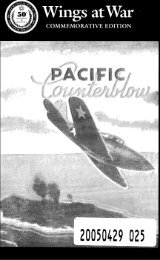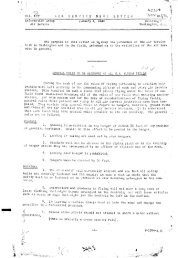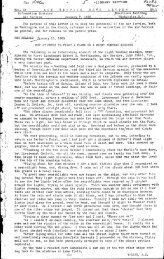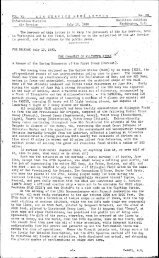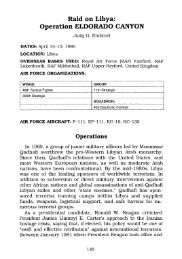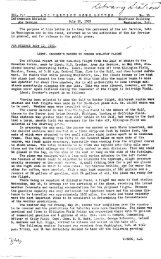News Letter 1941 Jul-Dec - Air Force Historical Studies Office
News Letter 1941 Jul-Dec - Air Force Historical Studies Office
News Letter 1941 Jul-Dec - Air Force Historical Studies Office
Create successful ePaper yourself
Turn your PDF publications into a flip-book with our unique Google optimized e-Paper software.
THE AIR FORCES NEWS LETTER<br />
would be doomed. No military leader would ever<br />
think of making such an attempt. The presence or<br />
absence of harbor defenses along the American<br />
coast would be of no importance whatsoever against<br />
a sea-corne invasion, as long as we possess ample<br />
land-based air power.<br />
It may be argued that naval vessels have not been<br />
driven off the seas .within bombing range in the<br />
North Sea and the Mediterranean, and that convoys<br />
are operating occasionally even in the English<br />
Channel. The reasons that this is possible will<br />
be considered in more detail later. It suffices<br />
for the present to note that these ships are subje~t<br />
to bombing raids for relatively short periods<br />
of time, that they first must be discovered, and<br />
that they are not tied up at docks nor subject to<br />
bombardment for long periods. None of these favorable<br />
factors applies to an effort to unload troop<br />
transports nor to the continuing supply and reenforcement<br />
of troops already landed. In Norway,<br />
the British landed their first troops but could<br />
not reenforce them once the bases were discovered<br />
and watched and bombed constantly.<br />
What leader would be willing to risk thousands<br />
of men packed like sardines in a transport under<br />
the bombing conditions that can be visualized?<br />
Churchill would not. And if these transports had<br />
to come across an ocean to be met with enormously<br />
more intense bombing, no leader would consider it.<br />
The whole business of invasion across the sea<br />
against ample land-based air power no longer is in<br />
the book of possibilities.<br />
Almost no other event ~n the history of warfare<br />
equals this in importance. For the United States,<br />
particularly, the conclusion is transcendental.<br />
It makes it possible for this country to insure<br />
not only its own continental territory from invasion<br />
but, by the provision of a suitable air-base and<br />
airways system, to insure the impregnability of<br />
all North and South America. If this country takes<br />
advantage of the defensive powers given to it by<br />
the bombardment airplane, its impregnability to<br />
military invasion is assured in the foreseeable<br />
future.<br />
The successful German invasion of Norway through<br />
its principal harbors--OSlo, Stavanger, Trondheim,<br />
Narvik--has been cited to prove that had Norway<br />
been supplied with adequate harbor defenses, or if<br />
those defenses had not been tricked into impotenc~<br />
Norway could not have been invaded by the German~<br />
To quote one protagonist: -The salient fact was<br />
that the Germans went on in unopposed, tied up at<br />
the docks, put their men and supplies ashore, and<br />
proceeded to overrun the country." From this was<br />
deduced proof that had the Norwegian harbor defenses<br />
functioned effectively, the invasion could<br />
not have succeeded. <strong>Historical</strong>ly, however, most<br />
landings on hostile shore have been made away from<br />
harbors, and the troops have proceeded overland to<br />
22<br />
capture from the rear the harbor defenses and the<br />
cities they protected. Norway did have harbor defenses,<br />
and good ones, at Trondheim and Oslo. It<br />
was easy to trick them, and once the Germans were<br />
within the harbors ,.these defenses no longer had<br />
any value.<br />
Much more important was the fact that Norway<br />
had no air force. Had a Norwegian air force been<br />
in existence, it would have been able to block the<br />
German invasion of Norwegian harbors just as effectively<br />
as the German air force later blocked<br />
the British invasion of Norwegian harbors. And<br />
this would be true whether or not Norway had any<br />
harbor defenses. In the case of the ports distant<br />
from Germany--Trondheim and Narvik--an ample Norwegian<br />
air force would have made German operations<br />
in these ports impassible. They were too distant<br />
for hostile operations to be protected by German<br />
air power based in Denmark or Germany. Even Oslo<br />
is 200 miles from the Aalborg airport used by the<br />
Germans in Denmark, and a small air force should<br />
have been able to best much larger German fighter<br />
forces that might have been used to protect the<br />
landing in Oslo. The Norwegian harbor defenses<br />
were made impotent by false messages or treachery.<br />
Within an hour, their usefulness had vanished because<br />
German forces had passed them. The air<br />
forces might have been tricked for a short time,<br />
but since air bases usually are-back from the coast,<br />
their impotence would have been of short duration<br />
<strong>Air</strong> power has still another advantage as a defensive<br />
force. This is its ability to assemble<br />
and concentrate its entire power for operations<br />
against a single point. Harbor defenses are immovable,<br />
and the individual forts can give no assistance<br />
to the forts 50 or 200 miles away. But<br />
all the bombing planes in the nation can be concentrated<br />
so as to apply their power at the single<br />
threatened point, and this concentration can take<br />
place with almost incredible rapidity--in a day or<br />
two at the most. 1<br />
Prime Minister Churchill explained the failure<br />
of the British fleet to operate in the Skagerrak<br />
on German communications toNorway as follows: "DJt<br />
immense enemy air strength, which can be brought to<br />
bear on our patrolling craft, makes this method far<br />
too costly to be adopted. Important forces would<br />
have to be employed in order to maintain a steady<br />
surface patrol and the losses which would have<br />
been inflicted on the patrol from the air would<br />
undoubtedly very soon constitute a naval disaster."<br />
In other words, the British patrolling vessels<br />
would have had to remain on duty in the Skagerrak<br />
subject to continuous bombing by immense air forces.<br />
The operation was impossible, and the British were<br />
correct in not making the effort.<br />
Prime Minister Churchill's objections to operating<br />
in the Skagerrak were abundantly proved when<br />
the Br itish fleet operated under similar condit ions<br />
in attempting to prevent the invasion of Crete.




